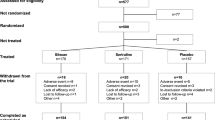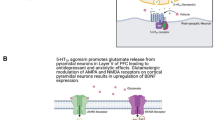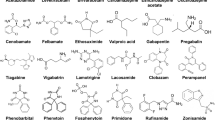Abstract
Efficacy and tolerability of Hypericum LI 160 was compared to fluoxetine and placebo in mild to moderate Major Depression (DSM–IV) in a 4–week randomized, double–blind trial. One hundred and sixtythree outpatients from 15 general practitioner centers received either 900 mg Hypericum LI 160, 20 mg fluoxetine, or placebo daily. Amelioration was measured by the Hamilton and the Montgomery–Åsberg Depression scales. Response and remission rates and global ratings by investigators and patients were measured. Adverse event reports, laboratory screening, vital signs, physical exams and ECG were collected. No significant differences could be observed regarding efficacy measures except for remission rate (Hypericum 24%; fluoxetine 28%; placebo 7 %). Hypericum was significantly better tolerated than fluoxetine. Hypericum LI 160 or fluoxetine were not more effective in short–term treatment in mild to moderate depression than placebo.
Similar content being viewed by others
References
American Psychiatric Association (1994) Diagnostic and Statistical Manual of Mental Disorders (DSM-IV). American Psychiatric Press: Washington DC
Baker CB, Johnsrud MT,Crismon ML, Rosenheck RA,Woods SW (2003) Quantitative analysis of sponsorship bias in economic studies of antidepressants. Br J Psychiatry 183:498–506
Brenner R, Azbel V, Madhusoodanan S, Pawlowska M (2000) Comparison of an extract of hypericum (LI 160) treatment of depression: a double-blind, randomized pilot study. Clin Ther 22:411–419
Brenner R, Bjerkenstedt L, Edman GV (2002) Hypericum perforatum extract (St. John’s wort) for depression. Psychiatr Ann 32:21–26
Chilvers C, Dewey M, Fielding K, Gretton V, Miller PR, Palmer BW, Weller D, Churchill R, Williams I, Bedi N, Duggan C, Lee A, Harrison G (2001) Antidepressant drugs and generic counselling for treatment of major depression in primary care: randomised trial with patient preference arms. Br Med J 322:772–775
Deltito J,Beyer D (1998) The scientific, quasi-scientific and popular literature on the use of St. John’s Wort in the treatment of depression. J Affective Disord 51:345–351
Doogan DP, Langdon CJ (1994) A double-blind, placebo-controlled comparison of sertraline and dothiepin in the treatment of major depression in general practice. Int Clin Psychopharmacol 9:95–100
Ernst E, Rand JI, Barnes J, Stevinson C (1998) Adverse effects profile of the herbal antidepressant St. Johns wort (Hypericum perforatum L.). Eur J Clin Pharmacol 54:589–594
The European Agency for the Evaluation of Medicinal Products (1998) Concept paper on the revision of the committee for proprietary medicinal products (CPMP) note for guidance on medicinal products for the treatment of depression (CPMP/EWP/ 518/97 concept paper). London: EMEA
Fabre LF, Putman HPr (1987) A fixed-dose clinical trial of fluoxetine in outpatients with major depression. J Clin Psychiatry 48:406–408
Gupta RK, Möller HJ (2003) St. John’s Wort.An option for the primary care treatment of depressive patients? Eur Arch Psychiatry Clin Neurosci 253:140–148
Guy W (1976) ECDEU Assessment Manual for Psychopharmacology (76–338) Rockville, Md: US Department of Health, Education, and Welfare publication (ADM)
Hamilton M (1967) Development of a rating scale for primary depressive illness. Br J Soc Clin Psychol 6:278–296
Harrer G, Schmidt U, Kuhn U, Biller A (1999) Äquivalenzvergleich Johanniskrautextrakt LoHyp-57 versus Fluoxetin. Arzneim Forsch/Drug Res 49:3–10
Hoffmann J, Kühl ED (1979) Therapie von depressiven Zuständen mit Hypericin. Zeitschrift für Allgemeinmedizin 55:776–782
Hypericum Depression Trial Study Group (2002) Effect of Hypericum perforatum (St. John’s Wort) in major depressive disorder: a randomized controlled trial. JAMA 287:1807–1814
Khan A, Leventhal RM, Khan SR, Brown WA (2002) Severity of depression and response to antidepressants and placebo: an analysis of the Food and Drug Administration database. J Clin Psychopharmacol 22:40–45
Kim HL, Streltzer J, Goebert D (1999) St. John’s wort for depression. A meta-analysis of well-defined clinical trials. J Nerv Ment Dis 187:532–539
Kirsch I, Sapirstein G (1998) Listening to Prozac but hearing placebo: a meta-analysis of antidepressant medication. Retrieved from the World Wide Web: http://journals.apa.org/ prevention/volume1/pre0010002a.html
Linde K, Ramirez G, Mulrow CD, Pauls A, Weidenhammer W, Melchart D (1996) St John’s wort for depression – an overview and meta-analysis of randomised clinical trials. Br Med J 313:253–258
Linde K, ter Riet G, Hondras M,Vickers A, Saller R,Melchert D (2001) Systematic reviews of complementary therapies – an annotated bibliography. Part 2: Herbal medicine. BMC Complementary Alternative Medicine
Lingjaerde O, Ahlfors UG, Bech P, Dencker SJ, Elgen K (1987) The UKU side effect rating scale. A new comprehensive rating scale for psychotropic drugs and a cross-sectional study of side effects in neuroleptic-treated patients. Acta Psychiatr Scand 334:1–100
Montgomery SA (1999) The failure of placebo-controlled studies. Eur Neuropsychopharmacol 9:271–276
Montgomery SA, Åsberg M (1979) A new depression scale designed to be sensitive to change. Br J Psychiatry 133:382–389
Müller MJ, Himmerich H, Kienzle B, Szegedi A (2003) Differentiating moderate and severe depression using the Montgomery- Asberg depression rating scale (MADRS). J Affective Disord 77:255–260
Parker G, Anderson IM, Haddad P (2003) Clinical trials of antidepressant medications are producing meaningless results. Br J Psychiatry 183:102–104
Schrader E (2000) Equivalence of St John’s wort extract (Ze 117) and fluoxetine: a randomized, controlled study in mild-moderate depression. Int Clin Psychopharmacol 15:61–68
Shelton RC, Keller MB, Gelenberg A, Dunner DL, Hirschfeld R, Thase ME, Russell J, Lydiard RB, Crits-Cristoph P, Gallop R, Todd L, Hellerstein D, Goodnick P, Keitner G, Stahl SM, Halbreich U (2001) Effectiveness of St John’s wort in major depression: a randomized controlled trial. JAMA 285:1978–1986
Stevinson C,Ernst E (1999) Safety of Hypericum in patients with depression. CNS Drugs 11:125–132
Stokes PE, Holtz A (1997) Fluoxetine tenth anniversary update: the progress continues. Clin Ther 5:1135–1250
Walsh BT, Seidman SN, Sysko R, Gould M (2002) Placebo response in studies of major depression: variable, substantial, and growing. 287:1840–1847
World Health Organisation (1999) Adverse Reactions Terminology (WHO-ART). Uppsala: World Health Organisation
WMA (2000) Declaration of Helsinki. World Medical Association, www.wma.net/e/policty/17-c_e.html. Retrieved from the World Wide Web
Volz HP (1997) Controlled clinical trials of Hypericum extracts in depressed patients – an overview. Pharmacopsychiatry 30:72–76
Volz HP, Laux P (2000) Potential treatment for subthreshold and mild depression: a comparison of St. John’s wort extracts and fluoxetine. Compr Psychiatry 41:133–137
Vorbach EU, Arnoldt KH, Wolpert E (2000) St. Johns wort.A potential therapy for elderly depressed patients? Drugs Aging 16:189–197
Author information
Authors and Affiliations
Corresponding author
Rights and permissions
About this article
Cite this article
Bjerkenstedt, L., Edman, G.V., Alken, R.G. et al. Hypericum extract LI 160 and fluoxetine in mild to moderate depression. Eur Arch Psychiatry Clin Neurosci 255, 40–47 (2005). https://doi.org/10.1007/s00406-004-0532-z
Received:
Accepted:
Published:
Issue Date:
DOI: https://doi.org/10.1007/s00406-004-0532-z




